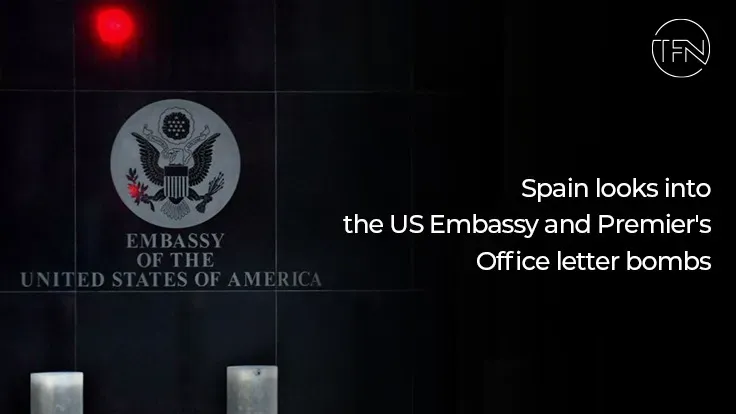A slew of letter bombs, identical to the one that exploded at the Ukrainian embassy and injured a staff member, were delivered to various targets, including the prime minister and the US embassy, and were being investigated by Spanish police on Thursday.
On November 24, a package containing "pyrotechnic substance" was delivered to Prime Minister Pedro Sanchez's official house, according to the interior ministry. A controlled explosion obliterated it.
In the meantime, Spain's High Court declared that it had expanded its initial inquiry into the letter bombing at the Ukrainian embassy to include all of the other occurrences.
Both declarations occurred a day after a mail bomb addressed to the Ukrainian envoy in Madrid caused a security guard at the embassy to receive a minor hand injury while opening it. This incident led Kyiv to increase security at all of its embassies throughout the world.
Like the other letters found, this one was delivered by normal mail.
Later that evening, a second "suspect postal shipment" was discovered at the Instalaza headquarters in the northeastern city of Zaragoza, according to the interior ministry.
The grenade launchers that Spain gives to Ukraine are made by Instalaza.
Then, early on Thursday morning, letter bombs were delivered to the defense ministry and an air base in Torrejon de Ardoz, a small town outside of Madrid, from which Spain donates weaponry to Ukraine.
Rafael Perez, Spain's state secretary for security, told reporters that the five incidents "share characteristics of the envelopes as well as their content."
“There are hints that the letters came from Spanish territory, but I suggest we should proceed with care because the investigation is still in its early stages.”
The interior minister reported a few hours later that a letter "with identical features as the others" had been intercepted at the US embassy in Madrid.
Serhii Pohoreltsev, the ambassador of Ukraine to Spain, seemed to attribute responsibility for the letter bomb at the embassy to Russia.
In an interview with Spanish national television late on Wednesday, he stated, "We are well aware of the terrorist practices of the aggressor countries."
He stated, "Russia's strategies and assaults require that we be ready for any incident, provocation, or attack.”
Nevertheless, the Russian embassy in Spain issued a statement on Thursday in which it declared that "any threat or terrorist act, especially those that threaten a diplomatic post, is to be rejected."
Margarita Robles, the defense minister, was the recipient of the letter to the ministry of defense. The one delivered to the air base was intended for a satellite office of the European Union situated there.
According to its website, this center uses information gathered from satellite images to support the bloc's foreign and security policies.
Security personnel discovered "a mechanism" within the envelope that was detected by an X-ray machine when it arrived at the air base, according to a statement from the ministry.
The envelope was still being examined by police.
Dmytro Kuleba, the foreign minister of Ukraine, reported that three embassies have already gotten threatening letters.
He continued, merely stating that the letters had been "drenched in red liquid" and not that they had carried bombs.
Following the explosion of the letter bomb at the country's embassy in Madrid on Wednesday, the country's foreign ministry announced that Kuleba had already ordered increased security at all of their embassies.
According to Spain's interior minister, the government has mandated tighter security at all embassies, consulates, and "any sites that require special protection."
After the beginning of Russia's invasion of Ukraine in February, security had already been increased.
Spain is assisting Ukraine by delivering guns as well as training Ukrainian forces as part of a program run by the European Union and donating humanitarian aid.

